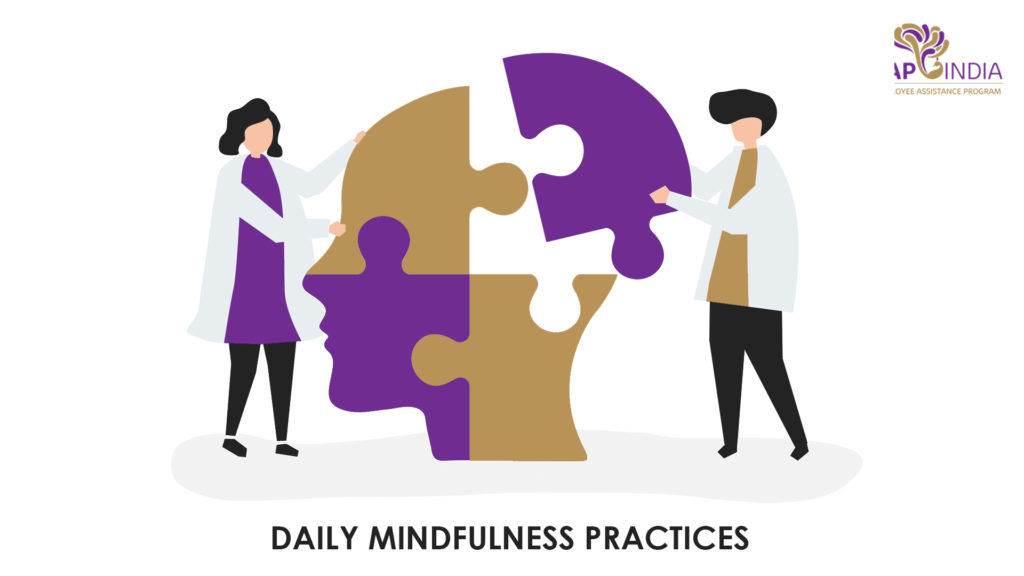Mindfulness means to be in the present.
Mindfulness is a state of active, open attention on the present.
There are many benefits in practicing mindfulness every day:
– When you’re mindful, you observe your thoughts and feelings from a distance, without judging them good or bad, this helps in reducing burnout levels and increases focus and happiness.
– Mindfulness helps you become resilient.
Most of us are so busy and have such hectic lives that we don’t even have a few minutes to sit and breathe. It is essential for our well-being to take a few minutes off to achieve a positive balance between mind, body, and soul.
Here are 5 mindfulness practices that can be done anywhere even for a few minutes:
- Mindful Breathing: This can be done even while standing up or sitting down. All you must do is be still and focus on your attention on your breathing for just five minutes. Let go of your thoughts, purposely pay attention to your breathing.
- Start by inhaling through your nose for 4 seconds.
- Hold the breath for 4 seconds.
- Exhale through your mouth for 4 seconds.
- Hold for 4 seconds.
- Mindful Eating: Mindful eating requires you to focus on what food you’re eating, the food intake and how you’re consuming it. Here are some points that can help you with eating mindfully the next time.
- Listening to your body while eating and stopping when you feel full.
- Eating only when our body gives out signals to do so (stomach growling, headaches)
- Eating at a set time.
- Consuming food that is nutritious instead of constantly consuming emotionally comforting food.
- While eating, only eat, don’t multi-task. Eat peacefully.
- Mindful Moving: Paying attention while walking helps us in staying safe by remaining fully aware of whatever is around. Whether moving to the home work desk, or going to buy groceries, or even going for a walk, being aware of the surroundings helps. While walking, here are some of the things that you can keep in mind:
- You can count to ten steps at a time, moving in your natural pace.
- If you’re in a smaller space while counting if you reach till 10, keep an intention in mind and turn around.
- Be aware of the sounds around you.
- Pay close attention to your sense of smell.
- Expand your awareness to your vision.
- Lastly, look back at your awareness of your physical movement.
- Mindful Communication: Having mindful conversations with someone, be it at work, or with your family or friends, is about talking to the whole person- without judgment and considering the conversation to be authentic and in the present moment. It helps in fostering an atmosphere of trust and brings us face to face with our anxieties about relationships. All of us can converse mindfully with keeping somethings in mind:
- You need to be clear in your language.
- Consider how you would want to express yourself.
- Choose an appropriate time.
- Pay attention to what’s going on with the person you’re addressing to.
- Mindful Sleeping: Before going to bed, take a few deep breaths to let your mind relax from the day you went through. Observe five to six mindful breaths. If you set out to force yourself to sleep, you won’t have a peaceful sleep time.
- Lay down on your back and close your eyes.
- Let your body relax by falling on the bed you’re sleeping on.
- Pay attention to your breathing. It is normal to get thoughts when you are sleeping.
- Bring back your attention to your breathing and let those thoughts pass by.
- Shift your attention to the sensations in your body. The sounds you can hear, the touch, the sense of smell, any internal bodily sensations that you can feel.
- Label the sensations and pay attention to anyone of those, before bringing your focus back to your breathing.
- In no time, you’ll be asleep peacefully with your body relaxing.
Conclusion
Mindfulness not only helps us in living in the moment but also awakens the whole moment to experience. Mindfulness helps us become aware of where our attention is so that we can respond well to situations with choices rather than reacting spontaneously.
Through mindfulness, we develop a fully conscious mind, with no limited thought patterns, freeing ourselves from the imprisonment of the unhelpful negative emotions and helps us in enabling to be more mindful, present, and focus on positive emotions that increase our self-compassion, assertiveness and understanding of ourselves and others.




